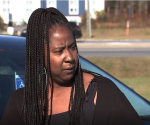Heart attack warnings signs in women can be subtle
[ad_1]
When Dr. Sandra Nichols had a massive heart attack, she didn’t tell anyone outside her immediate family.
At the time, she was working too much, not sleeping enough and says she felt the burden of being everything to everyone.
“I was embarrassed,” she said.
Despite her medical training, she didn’t realize symptoms of congestion and shortness of breath meant a heart attack was around the corner.
“I knew I only had so many beats per hour, per day for so many years,” she said. “And I had used those up with my attitude, with my pushing myself to be beyond what my body, my family, sometimes even I expected of myself.”
Nichols is lucky to be alive. When she collapsed during the heart attack she fell on her curling iron and had a major burn. The doctors told her daughter that if she woke up, she’d be lucky not to be brain dead. As a result of her cardiac arrest, she also needed a heart transplant.
Heart disease is the leading cause of death in the U.S. for both men and women, but studies show women wait longer to seek medical care than men — sometimes because women don’t know their symptoms can be different.
The signs of heart distress in women can be subtle and stress is a major contributing factor, said Dr. Anum Minhas, a cardiologist at Johns Hopkins.
“The heart is not just one thing independent of the rest of the body,” said Minhas. “You’re a full person who goes beyond just the biologic functions. There are psychological functions, there’s an emotional side to everything and really nourishing every aspect of your health will overall make you a much healthier person.”
Most cardiac events can be prevented through proper diet, consistent sleep, knowing family history and trying to keep stress to a minimum.
Knowing the ways heart attacks can present in women can be lifesaving. The arm pain that many men experience isn’t as common in women, but neck or jaw pain, shortness of breath, nausea and fatigue are common.
Nichols is now an advocate for the American Heart Association, a sharp contrast to hiding her condition from her friends and coworkers when she first was diagnosed.
She says it’s important to stop and listen to your body.
“Because if not, they might find themselves flat on the floor, unresponsive, unconscious,” she said. “And I strongly hope no one has to go through what I’ve gone through.”
[ad_2]
Source link











